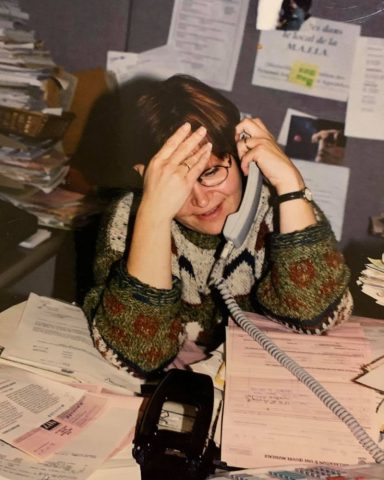As Senior Account Executive for Music Publishing, you might say that Huguette Langlois is SOCAN’s memory, and that, in a sense, her office was a second home for SOCAN’s Montréal branch employees for many years. As she was poised to take her well-deserved retirement, after 40 years of faithful service, she reviewed the far-reaching changes that have affected music publishing during her time in the field.
 Since every cloud has a silver lining, as the saying goes, the current health situation might actually make it easier for Huguette to transition to retirement – because, like her SOCAN colleagues, she’s been working from home since the first wave of the pandemic.
Since every cloud has a silver lining, as the saying goes, the current health situation might actually make it easier for Huguette to transition to retirement – because, like her SOCAN colleagues, she’s been working from home since the first wave of the pandemic.
“We’re all experiencing some grief during this pandemic,” she says. “Working from home and being cut off from your colleagues are part of this, and that might actually make the ‘break’ less painful for me. The members that used to drop by the office, and whom I used to bump into all the time, my contact with our team, those were things I no longer had during the pandemic. But frankly, it’s making it easier for me to move on,” says the music publishing specialist, who considers having been an ally of, and sometimes an accomplice to, the publishers – with whom she considers herself fortunate to have been working: “I felt I was part of their teams, and that I working right in their own offices, so to speak.
“Of course, the physical contact is no longer there, but we’ve managed to stay in touch with members, which is even more important in a situation that creates such challenges for the entire creative community. We’re happy to have been able to bring a level of support to our members. It’s tough on everyone, but at the creative level, they’ve been the first ones to get the brunt of it, and they’re going to be the last ones to get to recover,” says Huguette regretfully.
She recalls that her entry into the world of music publishing was purely accidental. As a young bank employee, she says, she’d heard about a music publishing job opportunity, “but I was totally clueless – I didn’t even know copyright existed! I was in tears for three months, wondering, ‘What have I done? I don’t understand anything!’” And then, gradually, she fell under the charm of that industry that came to fascinate her.
In 1981, Huguette took a position with CAPAC (Composers, Authors and Publishers Association of Canada), an organization that had been established in 1925 as the Canadian Performing Rights Society by the British Performing Rights Society , and that had positioned itself over time as one of Canada’s music publishing leaders. Huguette had already been with the organization for some time in 1990 when CAPAC merged with one of its competitors, PROCAN (the Performing Rights Organization of Canada), and became SOCAN. “A merger that was not easy,” she recalls, “but one that was good not just for music creators, but for music users too.”
One of the most significant changes to have occurred in the industry over Huguette’s four-decade tenure was, she says, how music publishers were perceived by music creators. During her first years with CAPAC, she “realized that having a publisher was not always viewed as being a good thing… [Songwriters] sometimes signed their agreements because they had to, without having actually read them – some were signing for life, sometimes without any obligation [on the part of the publisher].”
 From Huguette’s Account Executive point of view, the creation of the Professional Music Publishers’ Association (Association professionnelle de l’édition musicale-APEM) in 2002 greatly contributed to a more positive perception of the music publishing profession. Moreover, “APEM set up training programs that helped the profession evolve.” Huguette herself had many opportunities to share her expertise as part of music publishing workshops, where she always insisted on continued training “because this is a constantly evolving profession. The industry is changing all the time, and the music publishing profession must keep pace.”
From Huguette’s Account Executive point of view, the creation of the Professional Music Publishers’ Association (Association professionnelle de l’édition musicale-APEM) in 2002 greatly contributed to a more positive perception of the music publishing profession. Moreover, “APEM set up training programs that helped the profession evolve.” Huguette herself had many opportunities to share her expertise as part of music publishing workshops, where she always insisted on continued training “because this is a constantly evolving profession. The industry is changing all the time, and the music publishing profession must keep pace.”
The reason being, in her view, that if the music publishing profession is a specialization within the music industry, “music publishers have to be dealing with more than just copyright. They must be aware of everything that goes on in this industry if they want to be able to answer all of the questions” that are being raised by creators. “Songwriters need to create: they need to surround themselves with a team. Creators can find publishers they can trust, and in turn, that trust can help publishers promote music creators” by exploiting their works smartly.
Huguette Langlois is leaving SOCAN with a sense of accomplishment, and with the pride of having built a trusting relationship with music publishers, while still feeling “a bit sad to be leaving at this particular moment. Of course, the music publishing business has changed a great deal over the past 40 years, but change will occur so much faster [in the coming years], and the battles [that music publishers face] will be even greater” due to the re-alignment of the music industry along the digital axis.
“Our publishers are now facing the future with confidence, they’re fighting, they are joining coalitions involving all of the stakeholders of the Quebec music ecosystem, whereas, in the past, it was more like every man for himself,” she says. “Today, everybody understands that we have to unite if we want to push for legal changes, and help creators enjoy fairer tariffs.”
Happy retirement, Huguette!